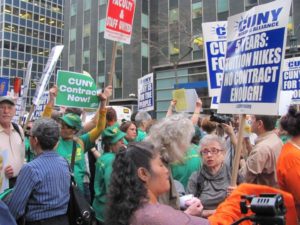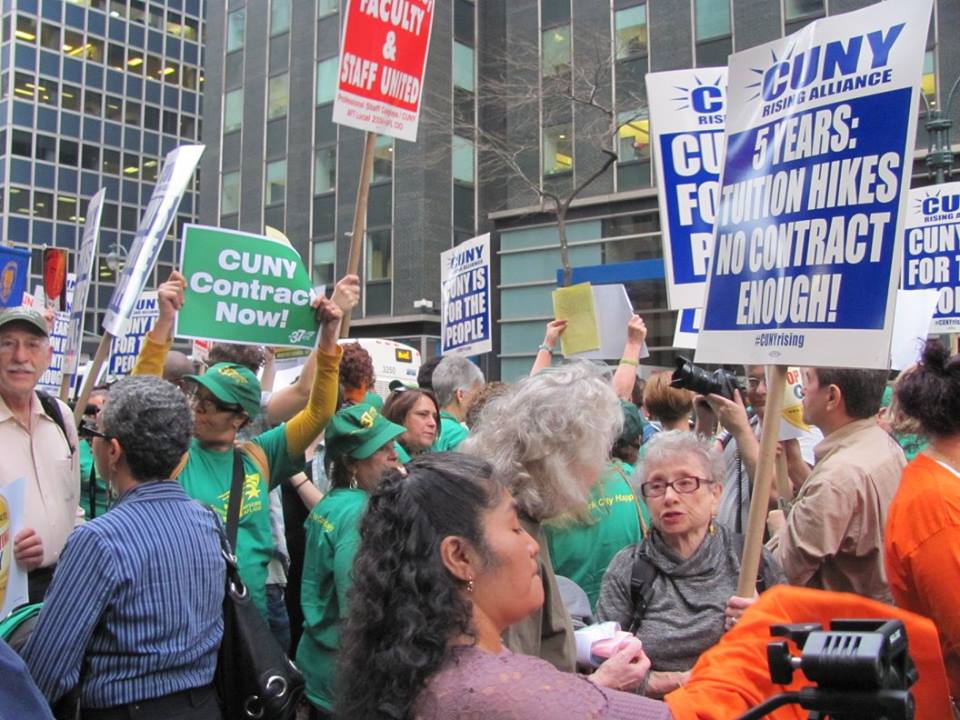
CUNY faculty and staff have demonstrated in rallies for a new contract, including the CUNY Rising event on March 10.
While CUNY students prepare for their finals, professors and staff have an assignment of their own—a vote to authorize use of a strike.
The Professional Staff Congress, the union representing more than 25,000 professors and staff at CUNY, notified their members that a vote for a strike authorization will begin from May 2 to 11. The union’s vote is a response to the lack of a contract for employees since 2010.
In a message to members, PSC President Barbara Bowen noted the vote does not mean the union will go on strike. But, she explained it would show CUNY it is prepared to get a contract.
“Think about what just happened at California State University. The faculty union held a strike authorization vote last fall, and 94 percent of voters said ‘yes.’ The union then announced that a five-day strike would take place across the huge Cal State system in April. On April 7, less than a week before the strike was scheduled to begin, the university administration met the union’s key demand for a higher salary increase,” Bowen said.
The PSC and CUNY met at least 20 times since 2010 for a new contract. But only one offer was given by CUNY on Nov. 4, which was rejected by the union for offering low salary hikes.
Gerry Martini, assistant director of Admissions at the Graduate Center, is voting yes to authorize a strike. He said he never expected he would choose such a vote.
Martini explained other professors and staff, especially those at CUNY since 2010, have struggled with the cost of living in New York City.
“In speaking with colleagues, people are really feeling like they are at the end of their rope. Six years without a contract means they have not seen a cost of living increase,” Martini said.
Martini noted students are affected by the lack of a contract. One example is adjuncts, who are paid nearly $3,000 per course. In addition, some people decline positions because of low pay.
“In some cases, CUNY students are missing out on faculty,” he said.
Martini stressed the vote does not mean the union will go on strike. Rather, it permits the PSC to have the power to call a strike if members say yes.
“It only means we’ve given our leadership the authority, if negotiations go beyond saving, to call a strike in the future,” he said.
The union did note, if members vote yes and no contract is reached, they may go on strike as early as next semester.
But striking in New York is illegal. The state’s Taylor Law, passed in 1967, allows collective bargaining for public employees, but bans strikes. Failure to follow this may include heavy fines and even jail time.
Earlier this year, CUNY filed a petition with the Public Employment Relations Board after it said talks were going nowhere. It said the union’s strike authorization vote was the main reason.
“Both sides are participating in an ongoing mediation process with meetings scheduled this month. The university continues to work with state and city officials to secure a fair and equitable contract settlement,” Rita Rodin, a spokesperson for CUNY, said.
Professors and staff can vote over the phone, through mail or on the internet. The union will announce results on May 12.
Update: This article is updated to reflect the Taylor Law does not allow public employees to go on strike.














